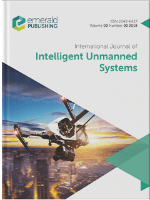
International Journal of Intelligent Unmanned Systems
Scope & Guideline
Exploring Innovations in Autonomous Technology
Introduction
Aims and Scopes
- Intelligent System Design and Implementation:
Research that explores novel algorithms and architectures for the design and implementation of intelligent systems, particularly in unmanned vehicles and robotics. - Autonomous Navigation and Control:
Studies focusing on the navigation and control of unmanned aerial vehicles (UAVs) and other autonomous systems, emphasizing optimization techniques, sensor fusion, and adaptive control methods. - Data Communication and Security:
Investigations into secure data communication frameworks for unmanned systems, addressing challenges such as data integrity, confidentiality, and efficient routing in wireless sensor networks. - Machine Learning and Artificial Intelligence Applications:
Application of machine learning and AI techniques to improve the performance and functionality of unmanned systems, including pattern recognition, decision-making, and predictive analytics. - IoT and Smart Systems Integration:
Research that integrates Internet of Things (IoT) technologies with unmanned systems to enhance their intelligence, connectivity, and operational efficiency. - Real-World Applications and Case Studies:
Empirical studies showcasing the practical applications of unmanned systems in various fields, including agriculture, healthcare, construction, and disaster management.
Trending and Emerging
- Deep Learning and Neural Networks:
There is a growing emphasis on deep learning techniques for various applications, including image classification, medical diagnosis, and autonomous navigation. - Cybersecurity in Unmanned Systems:
As unmanned systems become more prevalent, research on cybersecurity measures to protect these systems from attacks and vulnerabilities is increasingly important. - Multi-Agent Systems and Coordination:
Research on multi-agent systems, particularly in the context of UAV swarms and collaborative robotics, is emerging as a critical area of study. - Sustainable and Green Technologies:
An increasing focus on the development of sustainable technologies, such as renewable energy applications for unmanned systems, reflects a broader trend towards environmental consciousness. - Human-Robot Interaction and Collaboration:
Studies exploring the interaction between humans and unmanned systems, particularly in collaborative scenarios, are becoming more prominent.
Declining or Waning
- Traditional Robotics Applications:
Research on basic robotics applications has decreased, possibly due to the rise in more complex and intelligent systems that incorporate advanced AI and machine learning. - Basic Sensor Technologies:
Studies focusing on traditional sensor technologies without integration into intelligent systems or IoT frameworks are less frequent, as the field moves towards smarter and more interconnected solutions. - Static Path Planning:
Static path planning strategies are becoming less prominent, with a shift towards dynamic and adaptive planning techniques that consider real-time environmental changes. - Conventional Control Methods:
Research employing traditional control methods without the integration of intelligent algorithms is waning, as the focus shifts to more sophisticated adaptive and hybrid control approaches.
Similar Journals
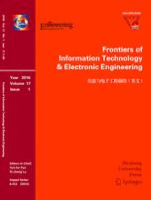
Frontiers of Information Technology & Electronic Engineering
Advancing the Boundaries of Technology and EngineeringFrontiers of Information Technology & Electronic Engineering, published by Zhejiang University Press, is a leading academic journal dedicated to advancing the fields of information technology and electronic engineering. With an impressive impact factor and categorized in the Q2 quartile across multiple fields including Computer Networks and Communications, Electrical and Electronic Engineering, Hardware and Architecture, and Signal Processing, this journal serves as a crucial platform for researchers and practitioners to disseminate cutting-edge research and innovations. The journal, which operates under an Open Access model, ensures that high-quality research is accessible to a global audience, fostering collaboration and knowledge sharing within the scientific community. Based in Hangzhou, China, and in operation since 2015, it has rapidly established itself as a reputable source of scholarly articles, ranking in the top percentiles in its respective categories with commendable Scopus rankings. By bridging academic research and practical applications, Frontiers of Information Technology & Electronic Engineering plays a pivotal role in shaping the future of engineering and technology.

IEEE Open Journal of Intelligent Transportation Systems
Driving Innovation in Intelligent Transportation.IEEE Open Journal of Intelligent Transportation Systems, published by the IEEE-INST ELECTRICAL ELECTRONICS ENGINEERS INC, stands at the forefront of innovation in the realm of intelligent transportation systems since its inception in 2020. With its open-access format, this journal aims to disseminate groundbreaking research and technology advancements to a broader audience, fostering collaboration and knowledge exchange among professionals in the automotive, mechanical, and computer science engineering sectors. It boasts impressive Q1 rankings in Automotive Engineering, Computer Science Applications, and Mechanical Engineering as of 2023, highlighting its critical role in shaping the future of transportation technologies. The journal's exceptional standing is further evidenced by its Scopus rankings; it holds the 76th percentile in Mechanical Engineering and the 74th percentile in Automotive Engineering, making it a premier outlet for cutting-edge research. Researchers, professionals, and students seeking to navigate the evolving challenges and solutions in intelligent transportation systems will find this journal an invaluable resource.

International Journal of Intelligent Computing and Cybernetics
Exploring Innovative Solutions in the Digital AgeThe International Journal of Intelligent Computing and Cybernetics, published by EMERALD GROUP PUBLISHING LTD, serves as a pivotal platform for advancing the field of intelligent computing and cybernetics since its inception in 2008. With a strong focus on innovative research and interdisciplinary collaboration, this journal is positioned in the prestigious Q2 category of Computer Science, ranking at an impressive 42nd out of 232 in Scopus, reflecting an 82nd percentile performance. The journal provides a venue for scholars and practitioners to disseminate their findings on cutting-edge technologies and methodologies that bridge the realms of computing, artificial intelligence, and cybersecurity. Although currently not an open-access journal, it widely circulates valuable insights essential for driving forward academic discourse and practical applications in the rapidly evolving digital landscape. Researchers, professionals, and students are encouraged to engage with this journal to stay at the forefront of advancements in intelligent systems and cybernetic solutions.

International Journal on Smart Sensing and Intelligent Systems
Catalyzing Knowledge in Engineering Excellence.The International Journal on Smart Sensing and Intelligent Systems serves as a pivotal platform for groundbreaking research in the fields of Control and Systems Engineering and Electrical and Electronic Engineering. Published by SCIENDO since 2008, this open access journal facilitates wide dissemination of knowledge, enabling researchers and professionals to share and access innovative ideas without barriers. With an ISSN of 1178-5608 and a strong commitment to advancing smart sensing technologies, it is recognized for its scholarly contributions and has achieved a respectable Q3 category ranking in both engineering categories as per the 2023 classifications. Covering diverse topics related to intelligent systems, the journal is positioned to impact the development of next-generation solutions in engineering. Its ongoing convergence from 2010 to 2024 highlights a dedication to fostering collaboration and discourse among scholars and practitioners across the globe.

Complex & Intelligent Systems
Exploring the Nexus of AI and Computational ExcellenceComplex & Intelligent Systems, published by SPRINGER HEIDELBERG, stands at the forefront of multidisciplinary research, focusing on the convergence of Artificial Intelligence, Computational Mathematics, and Engineering. With its rigorous peer-review process and impressive recognition within the academic community, this journal proudly holds a Q1 ranking in its respective categories for 2023, including a remarkable rank of #7 in Computational Mathematics out of 189 journals. Since transitioning to Open Access in 2015, Complex & Intelligent Systems has fostered accessibility and visibility for groundbreaking research, allowing professionals, students, and scholars worldwide to engage with high-impact studies. Hosted in the vibrant academic landscape of Switzerland, it not only enriches the scientific dialogue but also encourages innovative approaches to complex system analyses and intelligent solutions. With an unwavering commitment to advancing knowledge in evolving fields, this journal invites contributions that push the boundaries of research and application.
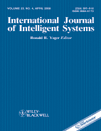
INTERNATIONAL JOURNAL OF INTELLIGENT SYSTEMS
Pioneering Insights in Intelligent Systems ResearchInternational Journal of Intelligent Systems, published by Wiley-Hindawi, stands at the forefront of the Artificial Intelligence, Human-Computer Interaction, Software, and Theoretical Computer Science fields. With an impressive Q1 ranking across multiple categories in 2023 and a robust track record since its inception in 1986, this journal is essential for researchers, professionals, and students alike who are eager to explore cutting-edge innovations and theoretical advancements. Located in the United Kingdom, the journal operates under the esteemed Wiley-Hindawi publishing house, ensuring a broad dissemination of high-quality research articles. The journal's diverse scope encompasses advancements in intelligent systems and their practical applications, fostering an interdisciplinary dialogue that encourages collaboration across various domains. Although Open Access options are not available, subscribers benefit from the rich repository of knowledge this journal offers, making it a vital resource in the rapidly evolving landscape of intelligent technologies.
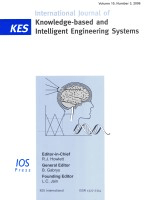
International Journal of Knowledge-Based and Intelligent Engineering Systems
Pioneering Insights in Knowledge-Driven EngineeringThe International Journal of Knowledge-Based and Intelligent Engineering Systems, published by IOS PRESS, serves as a vital platform for scholars and practitioners involved in the fields of Artificial Intelligence, Control and Systems Engineering, and Software Development. Founded in 2004 and continuously publishing through to 2024, this journal stands out with its comprehensive coverage of innovative methodologies and applications that leverage knowledge-based systems. Although currently listed in Q4 for Artificial Intelligence and Q3 for Control and Systems Engineering, it features an increasing trajectory in the scientific community, as indicated by its rankings in Scopus—which reflects the growing importance of intelligent engineering systems in contemporary research. With a commitment to disseminating cutting-edge research without open access constraints, this journal is essential for those seeking to understand and contribute to advancements in intelligent systems. Join a global community of researchers and industry leaders by engaging with the latest findings shared in this well-regarded journal.

Journal of Control Automation and Electrical Systems
Exploring the Future of Control and Automation EngineeringThe Journal of Control Automation and Electrical Systems, published by SPRINGER, is a prominent academic journal dedicated to advancing research in the interdisciplinary fields of control systems, automation, and electrical engineering. With an ISSN of 2195-3880 and E-ISSN of 2195-3899, this journal has emerged as a vital platform for disseminating high-quality research, contributing significantly to both theoretical and applied aspects of these interrelated domains. As of 2023, it ranks in the Q2 and Q3 quartiles across multiple categories, including Electrical and Electronic Engineering and Energy Engineering, showcasing its relevance and impact in the field. Although not an open-access journal, it provides rich access options for research works, ensuring that findings reach a wide audience. Researchers, professionals, and students alike can draw valuable insights from its curated articles that explore emerging trends, innovative technologies, and practical applications, thus reinforcing its position as a key contributor to the advancement of control and automation systems.

Journal of Unmanned Vehicle Systems
Unleashing potential through cutting-edge research in autonomous systems.Journal of Unmanned Vehicle Systems, published by CANADIAN SCIENCE PUBLISHING, is a leading peer-reviewed journal dedicated to advancing the field of unmanned vehicle technology. With an ISSN of 2291-3467, this journal provides an essential platform for researchers and professionals interested in the intersection of engineering, computer science, and control systems as they pertain to unmanned vehicles. The journal has achieved commendable rankings in Scopus, including a rank of #17/118 in Mathematics - Control and Optimization and #23/131 in Aerospace Engineering, reflecting its impact in these significant areas. As an open-access journal, it fosters global collaboration and accessibility, ensuring that innovative research in unmanned vehicle systems reaches a broad audience. The journal's objectives are to publish high-quality research articles, technical notes, and reviews that contribute to the understanding and development of autonomous systems. With its coverage spanning from 2013 to 2021, the Journal of Unmanned Vehicle Systems remains a vital resource for advancing discussions and knowledge in this rapidly evolving field.
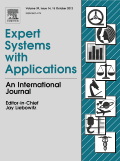
EXPERT SYSTEMS WITH APPLICATIONS
Exploring Innovations in Expert ApplicationsEXPERT SYSTEMS WITH APPLICATIONS is a premier journal published by PERGAMON-ELSEVIER SCIENCE LTD, dedicated to showcasing cutting-edge research in the fields of Artificial Intelligence, Computer Science Applications, and Engineering. With an esteemed Q1 ranking across multiple categories, this journal not only reflects high-quality scholarship but also plays a pivotal role in advancing the application of expert systems and intelligent technologies in various sectors. Operating from the United Kingdom, it features a wide range of insightful articles that address complex challenges and offer innovative solutions through interdisciplinary approaches. Researchers and practitioners can access invaluable resources to inform their work, contributing to the journal's strong reputation and growing readership. With its convergence of relevant technologies from 1990 to 2025, EXPERT SYSTEMS WITH APPLICATIONS stands as an essential source for those aiming to push the boundaries of knowledge in these thriving fields, making it a key platform for both established experts and emerging scholars.